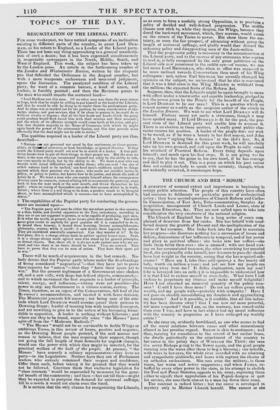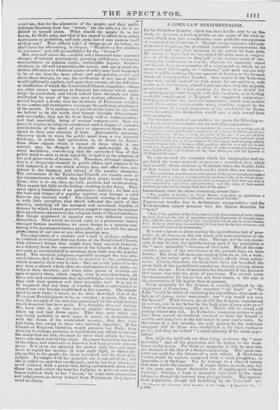THE CHURCH AND HER " BOSOM."
A QUESTION of unusual extent and importance is beginning to occupy public attention. The people of this country have often had occasion to deliberate on particular points of ecclesiastical policy ; they have mooted questions of Church Reform and Catho- lic Emancipation, of Test Acts, Tithe-commutation, Surplus Ap- propriation, management of Church Lands and Leases, state of Religious Education, &e. They are now called upon to take into consideration the very existence of the national religion. The Church of' England has for a long series of years com plained of desertion from her ranks. She has beheld with unaf- fected dismay the growth of Dissent and the multiplication of the forces of her enemies. She looks back into the past to ascertain her progress—she discovers nothing but a succession of losses and defeats, diminutions of her influence in temporal, and of her power and glory in spiritual affairs : she looks into her coffers—she finds them fuller than ever : she is amazed ; with one hand rest- ing on her accumulated treasure, the other scratching her puzzled head, she perplexedly asks herself, how it conies to pass she should have lost weight in the country, seeing that she has acquired sub- stance? " Here am I, (she thus soliloquizes,) a fine hearty old lady, worth six million a year; and yet see how my people are running away from me ! It defies explanation, upon my soul ! (she is betrayed into an oath ) it is impossible to understand how it is that I fail to endear myself to ever)body. What have I left undone to perpetuate my charms and make myself delightful ? Have I not absorbed an immortal quantity of the public trea- sure? Could I have done more ? Do not my coffers groan with wealth, and my people with—probably with sympathy ? Have I not gone on steadily consolidating my dominion and aggrandizing my fortune? And is it possible, is it credible, that all this indus- try has been thrown away ? that I am now not more powerful, not more respected ? that I am, on the contrary, less considerable than ever 1 was, and have in fact almost lost my moral influence with the country in proportion as I have enlarged my worldly estate ? "
So she runs on, evidently bewildered, as one who seems to find all the usual relations between cause and effect miraculously altered in her peculiar regard. Sorrow is akin to sentiment ; and thus, turning for consolation to the record of her earlier fame, she dwells pathetically on the attachment of the country to her cause in the palmy days of WILLIAM the Third ; she sees the seven Bishops going to the Tower again, and the good people running into the water after thorn to beg a blessing; she beholds, with tears in her eyes, the whole river crowded with an admiring and sympathetic multitude, and hears with rapture the chorus of an orthodox enthusiasm. She sees even the military, in those times, her warm and active supporters; and when JAMES, re- buffed by every other power in the state, in his attempt to abolish the Test and Penal Statutes, appeals to his army, enjoining them either to signify their approbation of his Popish designs or quit his service, she sees them almost to a man lay down their arms. The contrast is indeed bitter ; but the cause is enveloped in mystery only to Mother Church herself. She cannot or she won't see, that for the alienation of the people, and their multi- tudinous desertion from her " bosom," (as she calls it,) she is in- debted to herself alone. What should the people do in her bosom, for God's sake, now that it has ceased to afford them either sustenance or protection, and only seeks how it may pamper itself at their cost? Poor elderly lady! if things go on no better, we shall have her advertising, in despair, " Wanted—a few children to wet nurse," and still no candidates for the " bosom!"
But, over and above the manifold and a thousand times repeated charges of corrupt government, grasping selfishness, tyrannous encroachment on popular rights, incorrigible bigotry. besotted obstinacy in old and unmaintainable errors, and one general un- broken adherence to whatever course of policy may have happened to be at any time the most odious and anti-popular,—over and above these charges, we say, the verification of any one of white, would sufficiently explain, and more than excuse, all the defection or disaffection of which the Established Church complains,—there are other causes operating to diminish her retinue winch ought notito be overlooked, and which indeed hate obviously not been overlooked by some of her own most zealous adherents. It is proved beyond a doubt, that the furniture of Protestant worship is too sombre and unattractive to engage the enduring attachment of the people. It is perhaps no reproach to the latter to say, what we believe to be the truth, that though tolerably dispassionate and reasonable, they are far from being cold or unimeginative: and that especially, being of earnest temperament, they are prone to require in religious ceremonies such a degree of outward manifestation of the spirit of piety as appears to them to corre- spond to their own sincerity of faith. Abstractedly speaking, whatever tends to wean the public mind from a too material tendency, to refine and spiritualize it, to divert its desires from those objects which it cannot to those which it can control, may be deemed a desirable makeweight in the social machinery, considering that the unchecked bias of that public mind is such as most naturally to lead it to the adoption of low and gross views of human life. Therefore, although imagina- tion is a dangerous element in public affairs, and requires to be well tempered, it is one which always may, and often does, con- tribute to the harmony and felicity of the popular character. The ceremonies of the Established Church are exactly such as the circumstances in which they had their origin would he-peak them ; that is to say, they are cold, prudish, and uninteresting. They appeal but little to the feeling—nothing to the fancy. They arose upon a foundation of no permament stability ; for how can the heat and temper of a popular reaction ever become a solid basis for any national work ? The Church worship of our time is, with little exception, that which reflected the spirit of this reaction, including all the assumed and unnatural frigidity of manner by which a vexed generation sought to express by contrast their passionate objection to the religious forms of their forefathers. But things originated in impulse can with difficulty sustain
_themselves. That which we would raise to a permanent station amongst human institutions, we must design in a manner con- sisting with permament human principles, and not with the moral phosnomena of our own or any other peculiar sera.
The experiment of a century and a half is perhaps sufficient to establish in evidence that the forms of the Established Church, with whatever favour they might have been received formerly, as a delivery from the superstitions of the Church of Rome, are not such as are calculated to maintain their hold over the popular mind. The sincerely religious, especially amongst the less edu- cated classes, find in those forms no response to the enthusiasm which animates their own breasts : they are easily induced to de- sert from a church which offers no excitements to their faith—no helps to their devotion; and when other places of worship are open to receive them, which supply, even in over-abundance, all those aids and concomitants they missed before, what wonder that they shift their quarters and their principles too? It is not to be supposed that any form of worship which is extravagant or absurd can ever become established in this country. The attach- ment to such forms is based, as we have described that of the Protestant Establishment to be, in reaction ; it arises, like that, front the strength of the aversion entertained for the religion from which desertion has been made. It is therefore also not lasting. We have seen in our time several popular religious manias taken up and laid down again. That they were taken up, was owing probably in most cases to ennui, or dissatisfaction with the forms of the established worship ; that they were laid down, was owing to their own intrinsic absurdity. If the Church of England, therefore, would preserve her flocks from straying to strange pastures, or would make any efforts to recover the sheep that are lost, she must do more than reform he: man- ners—she must remodel her ritual. She must descend to the level of the times, and vouchsafe to borrow a leaf from popular govern- ment. It is of no use mincing the matter with her—she must learn to regard her services in their right light, as duties dis- chargeable to the people, for them instituted and by them to be judged. To tamper with her principle she is not called on ; but she is called on, and that vociferously, and by her best Mends, to avoid collision with a power that, being encountered, must over- throw her, and—since the time for bullying is past—to roar her truant children back to her " bosom," by some such concessions and indulgences as, being weaned from Puritanism, they have a mind to obtain.



























 Previous page
Previous page